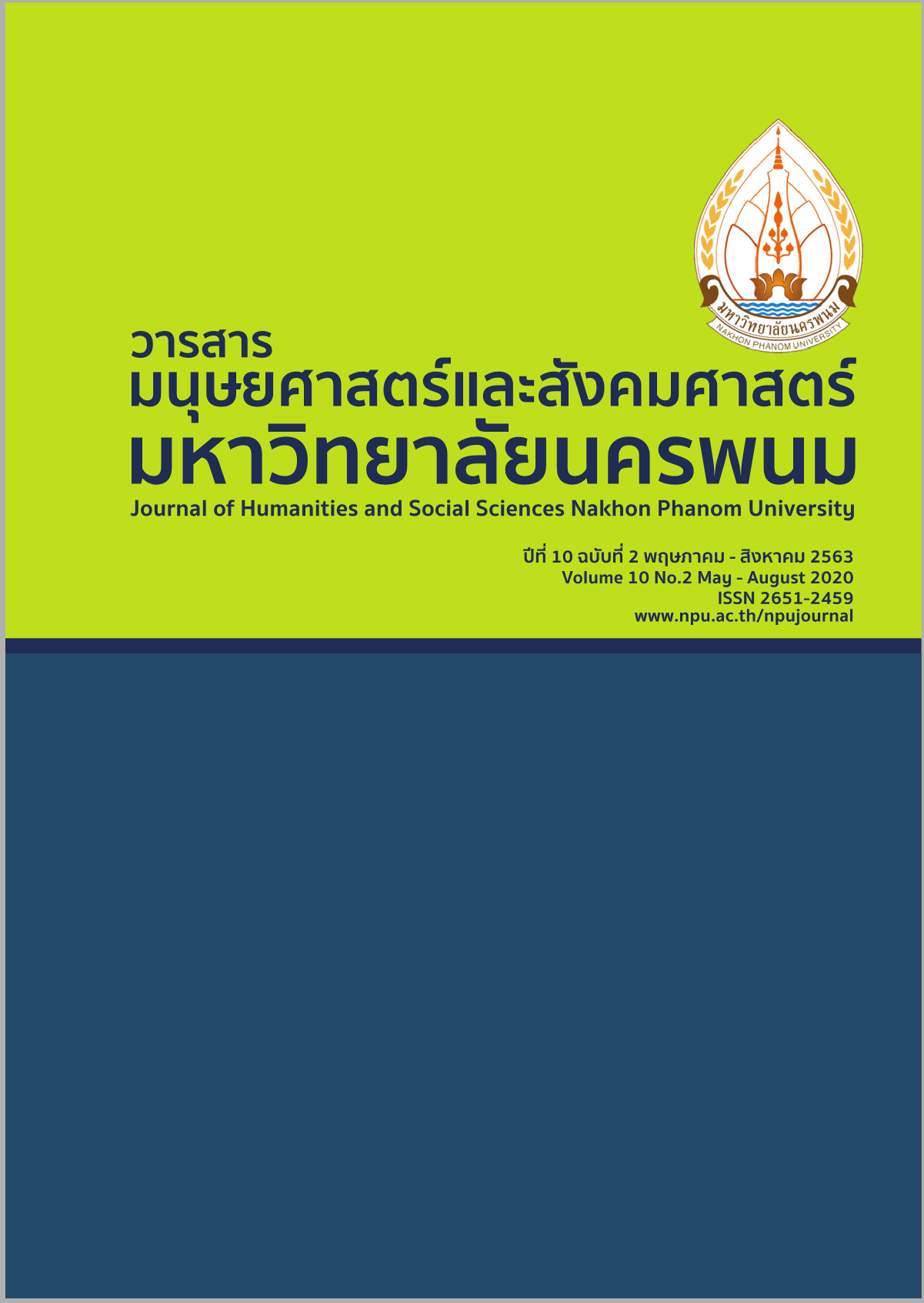The Operational Development Model of Buddhist Oriented Schools in The 4.0 Era of Educational institutions under Udon Thani Primary Educational Service Area Office 3 Development of operational model, Buddhist way school in the 4.0 era, Place of education
Main Article Content
Abstract
Abstract
The objectives of the research were: 1) to study the components of the Buddhist Way Operation in the 4.0 Era Schools under Udon Thani Primary Educational Service Area Office 3; and 2) to develop the Buddhist Way Operation Model in the 4.0 Era Schools under Udon Thani Primary Educational Service Area Office 3. A mixed methodology, quantitative and qualitative research were used in the study, with 3 steps: Step 1: Delphi Technique, 21 experts of the school Administrators were interviewed. Step 2: Focus group, there were 9 experts in a focus group discussion meeting. Step 3: Evaluation, 318 stakeholders were involved in this step. The data was analyzed by using the Percentage, Mean, Median, Standard Deviation and Interquartile Range.
Based on the findings of the study, it was concluded that
- The components of the Buddhist way operation in the 4.0 Era schools under Udon Thani Primary Educational Service Area Office 3 consisted of 6 components. They were: 1) the teaching and learning management; 2) the use of learning materials; 3) the use of learning resources; 4) the setting of school atmosphere; 5) the basic life activities arrangement; and 6) the Buddhist activities arrangement.
- The development of Buddhist Way Operation model in the 4.0 Era schools under Udon Thani Primary Educational Service Area Office 3 was validated overall at a high level ( = 4.07). According to the 6 components, the setting of school atmosphere rated the mean at the highest level at 4.17, followed by the basic life activities arrangement at 4.16, the Buddhist activities arrangement at 4.10, the teaching and learning management at 4.07, the use of learning materials at 3.97, the use of learning resources at 3.93 respectively.
Article Details
References
องค์การขนส่งสินค้าและวัสดุภัณฑ์
จอมพงศ์ มงคลวนิช.(2555) การบริหารองค์การและบุคลากรทางการศึกษา (พิมพ์ครั้งที่ 1),
กรุงเทพ, สำนักพิมพ์แห่งจุฬาลงกรณ์มหาวิทยาลัย : 20 – 50
ชาญชัย อาจินสมาจาร. (ม.ป.ป) หลักการบริหารการศึกษาและการจัดการศึกษา,กรุงเทพ,
CU Book.
เด่น ชะเนติยังและคณะ. ( 2559 ), การพัฒนารูปแบบการจัดการศึกษาแบบมีส่วนร่วมของจังหวัด
พัทลุง,ดุษฎีนิพนธ์ สาขาวิชาการบริหารการศึกษา บัณฑิตวิทยาลัย มหาวิทยาลัยเวสเทิร์น
นิษฐ์วดี จิรโรจน์ภิญโญ. ( 2560 ), ความสัมพันธ์ระหว่างการบริหารแบบมีส่วนร่วมกับธรรมาภิบาลของผู้บริหารใน
สถานศึกษา สังกัดสำนักงานเขตพื้นที่การศึกษาประถมศึกษาราชบุรี เขต 2, ผลงานวิจัย สาขาวิชาการบริหาร
การศึกษา บัณฑิตวิทยาลัย มหาวิยาลัยเวสเทิร์น
บุญใจ ศรีสถิตนรากูร (2555),การพัฒนาและตรวจสอบเครื่องวิจัย :คุณสมบัติการวัดเชิงจิตวิทยา.
กรุงเทพฯ,โรงพิมพ์แห่งจุฬาลงกรณ์มหาวิทยาลัย
พรนภา เอกนิพนธ์และชุติมา มุสิกานนท์.(2561), การพัฒนารูปแบบการบริหารงานวิชาการที่มีประสิทธิผลใน
โรงเรียนประถมศึกษา สังกัดสำนักงานเขตพื้นที่การศึกษาประถมศึกษานครพนม เขต 1,ดุษฎีนิพนธ์
ปรัชญาดุษฎีบัณฑิต สาขาวิชาการบริหารการศึกษา มหาวิทยาลัยเวสเทิร์น
พระเทพโสภณ.(ประยูร ธมฺมจิตฺโต).(2546) “ทิศทางการศึกษาไทย”. กรุงเทพมหานคร : โรงพิมพ์
มหาจุฬาลงกรณ ราชวิทยาลัย.
พระธรรมปิฎก (ป.อ. ปยุตฺโต).( (2546)“สู่การศึกษาแนวพุทธ”. พิมพ์ครั้งที่ 2.กรุงเทพมหานคร :
องค์การรับส่งสินค้าและพัสดุภัณฑ์ (ร.ส.พ.).
สุนทร โคตรบรรเทา (2560). การบริหารการศึกษา หลักการและทฤษฎี(ฉบับปรับปรุง),กรุงเทพฯ,
สำนักพิมพ์ปัญญาชน.
Abramson. Mark A. (1996)."In Search of the New Leadership" . Management, September.
Alpay,E.(2003),Self – Concept and Self – Esteem,(online), Available: www.ce.ic
Biskin,Donald S. & Hosdinson Kenneth (1997), “An Experimental Test of the Effect
of Structured Discussions of Moral Dilemmas Found in Children’s
Literature in Moral Reasoning”. The Elementary School juornal.77 (5)


